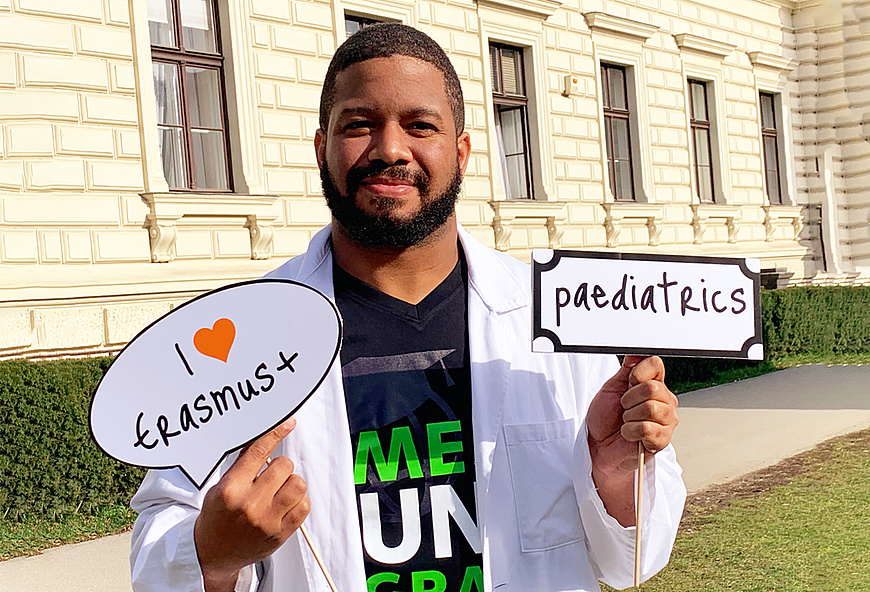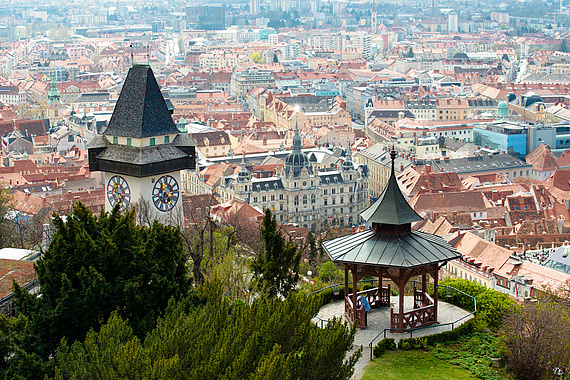- The University
- Studying
-
Research
- Profile
- Infrastructure
- Cooperations
- Services
-
Career
- Med Uni Graz as an Employer
- Educational Opportunities
- Work Environment
- Job openings
-
Diagnostics
- Patients
- Referring physicians
-
Health Topics
- Health Infrastructure
Clinical rotation/Traineeship at Med Uni Graz
Medicine, dentistry and nursing students from abroad have the opportunity to complete a clinical rotation/an traineeship at Med Uni Graz as part of the mobility programs Clinical Rotations Exchange, Erasmus+ or CEEPUS. The prerequisite is:
- The home institution is a partner institution of Med Uni Graz
- OR The home institution participates in the Erasmus+ mobility program (a bilateral agreement between the home institution and Med Uni Graz is not necessary but is an advantage).
- OR The home institution is located in a country that participates in the CEEPUS mobility program.
Clinical rotations/traineeship are possible at University Hospital Graz and in exceptional cases at a Med Uni Graz teaching hospital.
Clinical rotation at Med Uni Graz

My experience in Graz was one of the best rotations that I have made in my career because I was able to bond with the residents and professors of the department of pediatrics and pediatric surgery, as well as my colleagues because we were able to form a multicultural group in which we got to know and support each other during our time together.
Kevin Cristopher Ortiz Soto, Instituto Tecnológico de Santo Domingo (INTEC), Dominikanische Republik
Partner institutions, Erasmus+ program countries and CEEPUS countries
Partner institutions for clinical rotations/Traineeships at Med Uni Graz (Clinical rotations exchange)
- Albania: Canadian Institute of Technology
- Albania: University of Medicine, Tirana
- Australia: The University of Queensland
- Australia: University of Western Australia
- Australia: University of Wollongong
- Brazil: Universidade Federal do Rio de Janeiro
- Canada: Dalhousie University
- Canada: McGill University
- Canada: University of Alberta
- Canada: Western University
- Chile: Pontifica Universidad Catolica de Chile
- Chile: Universidad de Valparaíso
- China: Beijing University of Chinese Medicine
- China: Fudan University Shanghai
- China: Tongji University
- China: Wenzhou Medical University
- Colombia: Universidad CES
- Dominican Republic: Instituto Tecnológie de Santo Domingo
- India: Manipal Academy of Higher Education
- Indonesia: Gadjah Mada University
- Israel: Tel Aviv University
- Japan: Hiroshima University
- Japan: Kobe University
- Japan: Nagasaki University
- Morocco: Université Internationale Abulcasis des Sciences de la Santé
- Mexico: Universidad de Monterrey
- Namibia: University of Namibia
- Nepal: Kathmandu University
- New Zealand: University of Otago
- Oman: Sultan Qaboos University
- Peru: Universidad San Ignacio de Loyola
- South Africa: University of KwaZulu-Natal
- South Africa: Stellenbosch University
- South Africa: Walter Sisulu University
- South Korea: EWHA Womans University
- Taiwan (China): National Taiwan University
- Thailand: Chulalongkorn University
- Thailand: Mahidol University, Faculty of Tropical Medicine
- Thailand: Mahidol University, Ramathibodi Hospital
- Thailand: Chiang Mai University
- Thailand: Khon Kaen University
- Uganda: Makerere University
- USA: Central Michigan University
- USA: George Washington University
- USA: Nova Southeastern University
- USA: Rutgers Robert Wood Johnson Medical School
- USA: University of Kentucky
- USA: University of Missouri - Kansas City
- Vietnam: University of Medicine and Pharmacy at Ho Chi Minh City
Erasmus+ program countries
- EU member states including their Overseas Countries and Territories
- Iceland
- Liechtenstein
- Noth Macedonia
- Norway
- Serbia
- Türkiye
Please contact your International Office to find out whether or not your home institution participates in the Erasmus+ program.
CEEPUS countries
- Albania
- Austria
- Bosnia and Herzegovina
- Bulgaria
- Croatia
- Hungary
- Moldova
- Montenegro
- North Macedonia
- Poland
- Romania
- Serbia
- Slovakia
- Slowenia
- Czech Republic
- Prishtina (Kosovo) is also eligible to participate

Content of the clinical rotation/traineeship at Med Uni Graz
- Hands-on training and integration at the assigned department of University Hospital Graz or a Med Uni Graz teaching hospital
- Observation and participation in examinations and rounds (partly depends on German language skills)
- Analysis of case studies
- Becoming acquainted with the Austrian health care system

Language skills
As an incoming student, you must have English language skills. Communication in the hospital (between hospital staff and with patients) is conducted in German, but supervisors will translate the most important parts of the conversation into English for you. German is recommended but not absolutely necessary. In several departments and divisions, however, German is mandatory (see list below).
Possible specializations and departments
Clinical rotations/traineeships are possible at University Hospital Graz and in exceptional cases at a Med Uni Graz teaching hospital. A complete list of university departments and clinics at University Hospital Graz can be found here. Please note the following restrictions:
- Anesthesiology: German mandatory
- Cardiac Surgery: minimum length 4 weeks
- Emergency medicine: Apply for internal medicine/EBA (first monitoring admission), B2 level German mandatory
- General, Visceral and Transplant Surgery: minimum length 4 weeks
- Gynecology: Placements are only possible during holiday periods (February, July to September). Maximum length: 4 weeks
- Internal medicine: German is generally recommended, especially in endocrinology, hematology, and oncology, German is mandatory in cardiology. Minimum length: 4 weeks
- Neurology: B2 level in German mandatory
- Pediatrics: Placements are possible only as part of educational courses in pediatrics. Length: 4 weeks
- Psychiatry: B2 level in German mandatory
A list of Med Uni Graz teaching hospitals can be found here. The International Office tries hard to place you in the desired department, yet please note that under certain circumstances, not all departments may be available.

Length of the clinical rotation/traineeship
Clinical rotations/traineeships always begin on a Monday (ideally the first Monday of the month), end on a Friday and normally last four to eight weeks (depending on department and availability). Clinical rotations/traineeships funded by Erasmus+ must last at least two complete months; eight weeks are not sufficient.

Confirmation of completion and conditions
After the end of the clinical rotation/traineeship, you will receive a confirmation of completion if you meet the following criteria:
- Present every day from Monday to Friday between 8 AM and 4 PM or as arranged with the department
- Present at least 85% in each division
Confirmations of completion may only be issued by the International Office. Your confirmation is issued three workdays before your departure at the earliest and three workdays after the end of the traineeship at the latest. If your stay is funded by Erasmus+, you also receive a traineeship certificate (part of the learning agreement).

Housing
The International Office provides information on housing options for incoming students. Please contact your mobility coordinator for further details.
Application and deadlines
The application process varies depending on whether your home institution is a bilateral partner institution of Med Uni Graz (clinical rotations exchange) or if you would like to participate in a clinical rotation/an traineeship at Med Uni Graz as part of Erasmus+ or CEEPUS.
Clinical Rotations Exchange
To apply for a clinical rotation/traineeship at Med Uni Graz, you must be nominated by your home institution. Please contact the international office of your home institution for more information. You must be nominated by your home institution at least seven months before the planned start of the clinical rotation/traineeship.
Erasmus+ Traineeship (SMT)
To start the application process, send an email to erasmus-incoming-smt(at)medunigraz.at. The request should be made seven to eight months before the planned clinical rotation/traineeship and include the following information/documents:
- Desired time period
- Desired department
- CV
- Letter of motivation
- Proof of language skills in English and/or German (unless German is your first language or you are completing your entire course of study in German)
The European Commission support for the production of this publication does not constitute an endorsement of the contents which reflects the views only of the authors, and the Commission cannot be held responsible for any use which may be made of the information contained therein.
CEEPUS
There are two ways to participate in a CEEPUS mobility program:
- Participation as part of the network "Image Processing, Information Engineering & Interdisciplinary Knowledge Exchange" or the network "Training and research in environmental chemistry and toxicology": Check whether your home institution participates in one of the two networks (see CEEPUS website > "Find a Network"). If it does, contact the network coordinator at your home institution. You must be nominated for a CEEPUS scholarship by him/her. The application deadlines can be found at the CEEPUS website.
- Participation as a free mover: As a free mover, you can apply for a CEEPUS scholarship at Med Uni Graz even if you are outside of a network. Free mover scholarships are only awarded if funding allocated to network mobility programs remains available. Contact the national CEEPUS office (NCO) in your home country. You must be nominated for a CEEPUS scholarship by the NCO. The application deadlines can be found at the CEEPUS website.

Accident and liability insurance
As an incoming student in Clinical Rotations Exchange, Erasmus+ and CEEPUS mobility programs, you are enrolled at Med Uni Graz and entitled to accident and liability insurance upon payment of the Austrian student union fee (approximately EUR 26). Information can be found here.


